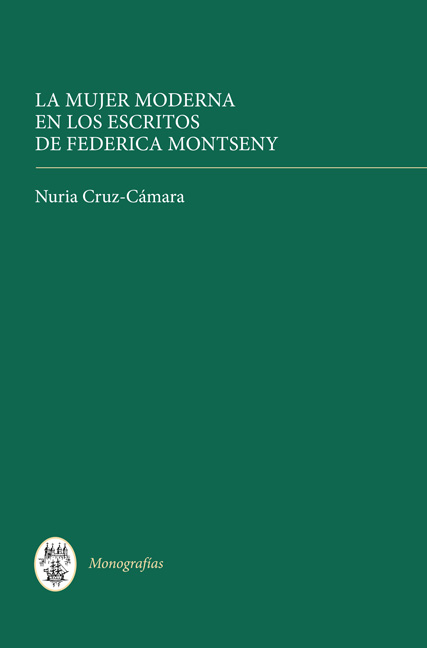
- Publisher:
- Boydell & Brewer
- Online publication date:
- December 2015
- Print publication year:
- 2015
- Online ISBN:
- 9781782045014
- Subjects:
- Literature, Area Studies, European Literature, European Studies
- Series:
- Monografías A

Este libro explora la representación de la mujer moderna en los ensayos y la ficción de Federica Montseny (1905-1994), líder anarquista española de gran prominencia en las décadas de 1920 y 1930. Se examinan en profundidad sus escritos sobre la cuestión de la mujer a la luz de las premisas filosóficas que sustentan el ideario del anarquismo. Además, su ficción mantiene un complejo diálogo con los discursos científicos y culturales de género que proliferaron durante las primeras décadas del siglo XX. La mujer moderna de Montseny no consiste en una figura única, finalizada y estática, sino que se desplaza entre una diversidad de articulaciones a veces contradictorias, pero que reflejan por igual sus creencias anarquistas. Montseny, quien gozó; de enorme popularidad en su época como escritoray política, elaboró y diseminó; algunas de las propuestas sobre la emancipación de las mujeres más originales de su tiempo, y este volumen es el primero en situar su pensamiento como una de las piezas fundamentales en la evolución del feminismo español.
Nuria Cruz-Cámara es Profesora Titular en la Universidad de Tennesse.
This book explores the figure of the modern woman in the essays and fiction of Federica Montseny (1905-1994), a prominent Spanish anarchist leader during the 1920s and 1930s. It examines in depth the author's theories of gender in light of the basic principles of anarchist political thought and philosophy. In addition, Montseny's novels are shown to engage in an elaborate and critical dialogue with scientific and cultural discourses on women that proliferated during the first four decades of the 20th century. Montseny's ideal modern woman is not a static and definite figure; rather, she shifts across different and at times contradictory articulations that, nonetheless, all fall within her anarchist beliefs. Montseny, a popular politician and writer during her time, developed and disseminated some of the most original concepts dealing with women's emancipation and gender theory, and the present volume is the first to situate her thought as a key component within the evolution of Spanish feminism..
Nuria Cruz-Cámara is Professor of Spanish at the University of Tennessee.
 Loading metrics...
Loading metrics...
* Views captured on Cambridge Core between #date#. This data will be updated every 24 hours.
Usage data cannot currently be displayed.